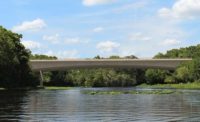When Superior Construction Co. Southeast officially won the $234-million Wekiva 6 contract in 2017, it was a big deal. For starters, the Florida Dept. of Transportation contract was the 80-year-old firm’s largest ever. But for the civil and transportation contractor, winning the job to build the Wekiva River Bridge—the signature element of Central Florida’s high-profile Wekiva Parkway project—wasn’t just about the numbers.
After all, it was the firm’s third Wekiva Parkway contract, out of six awarded by that time. Instead, as anyone familiar with the 25-mile-long corridor project knows, Wekiva 6 contains one of the nation’s most environmentally sensitive bridge projects, over a “wild and scenic river.” For decades, the crossing was the focal point for environmentalists’ protests that kept the sprawling corridor from being built.
“It’s a project that a lot of people have had exposure to over the years,” says Pete Kelley, company president. Now that it’s finally under construction, “It definitely has a lot of eyes watching it,” he says.
To Superior officials, though, Wekiva 6 meant something else. To them, it confirmed the midsize contractor’s long-planned strategy to grow in size based on the firm’s strength in constructing complex bridge structures, something that would expand its reputation as well.
“We looked at the Wekiva corridor about how deliberate we’ve been about geographic expansion,” Kelley says. The timing was right, too. In roughly 2015, just before the Wekiva Parkway corridor project began to move forward, Superior was finally ready to enter the Orlando-area market. And when it was time to bid Section 6, Superior officials eyed the contract’s complex, three-span river crossing project keenly.
“The Wekiva 6 project is very structure-intensive, and that’s what drew our interest,” Kelley explains. The ability to self-perform projects, largely with workers who have been with the company for many years, enables the firm to tackle such projects with some confidence, Kelley and others contacted by ENR for this story attest.
Including 18 bridges in all, the project includes three cast-in-place segmental box bridges over the Wekiva plus three other wildlife bridges totaling nearly 7,700 ft in length. The overall contract spans roughly six miles. Construction is roughly 25% complete to date.
“We’ve assembled a really solid group out there, from the leadership all the way down into the trades,” Kelley says. “It’s a highly visible project.
“Everything is clicking on all cylinders right now,” Kelley says of the project. But he could be speaking for the company overall.
The Jacksonville, Fla.-based contractor reported a 48% gain in 2017 revenue for the Southeast, with a total of about $238.2 million. That’s one of the largest percentage gains on this year’s Southeast Top Contractors ranking.
And that’s just one of the reasons that Superior Construction Co. Southeast earned its recognition as ENR Southeast’s Contractor of the Year.
In the last roughly 18 months, Superior Construction has expanded, opening three new offices: first in Tampa, followed by Nashville and most recently in Charleston, S.C. Though those offices opened in rapid succession, the contractor’s growth plan had been put in place several years ago.
Nick Largura, Superior’s 32-year-old CEO—and great grandson of the company’s founder, John Largura—says the contractor made a strategic decision to operate offices in both Orlando and Tampa, which are roughly one hour apart on Interstate 4.
“In the past, we had used a regional office to pursue work in adjacent cities, and we struggled because there was always a focus on (just) what was going on in our backyard,” Largura says. The fact that Orlando and Tampa are in different FDOT districts was another factor.
Also nudging Superior into Tampa was PCL Civil Constructors’ decision to close its office there.
“That was definitely part of” the decision, Largura says. Superior was able to fill a majority of its staff with former PCL workers.
Nashville was next, the result of a similar approach to Tampa, Largura says, namely “identifying markets where we could not see a dominant player and hopefully (we could) establish a foothold without having to buy our way into the market.”
Then, seeing a mounting need for infrastructure investment in Charleston, with its expanding port, Superior opened its office there. Though the funding for the city’s needed infrastructure work isn’t quite there yet, “Part of the corporate strategy is to be where the demand for the work is, ahead of time,” Largura says.
Rare Skill Set
Superior’s design partners see the contractor as ably filling a niche.
“Their ability to self-perform so much work with some senior-level people gives them a pretty unique perspective on projects,” says David Wantman, president of The Wantman Group, a West Palm Beach-based engineering firm. Another factor in Superior’s favor is the fact that senior-level executives stay intimately involved with their projects. That engagement makes a difference when pursuing work.
“Their leadership team gets their hands dirty,” Wantman says. “They spend a lot of time attending meetings, understanding projects, talking about the smallest of details to make sure they bid competitively, and also to know exactly what [they are] going to be constructing when [they are] successful” winning the contract.
“It’s not a bunch of people who are running a company that builds complex structures,” Wantman says. “It’s a bunch of people who have built complex structures running a company. There’s a big difference there.”
Gene Howerton, vice president with Arcadis, agrees, adding that the long-term status of Superior’s construction teams increases the contractor’s expertise overall, while aiding with communication.
“They have a lot of people doing their bridge construction that have been with them for a long time,” Howerton says. “They work well together as a team.”
Digital Modeling
Superior’s attitude and effort toward embracing the use of digital models in construction is perhaps greater than most other transportation contractors, says Howerton. Arcadis served as the lead engineer on Superior’s recently completed SR 9B Phase 2 project in Jacksonville. That project won an award of merit in ENR Southeast’s most recent Best Projects contest.
Now building SR 9B’s third phase together with Arcadis, Howerton says that the contractor is using machine control for all aspects of the latest project, including asphalt and concrete paving work.
Finally, Superior is taking steps elsewhere within the company to adapt. In 2017, the company instituted a wellness plan that includes a program for monitoring employees’ biometrics—i.e., weight, blood pressure and cholesterol. If employees opt into the biometrics monitoring, the company provides greater subsidies for their insurance costs.
Admitting that this is a “challenging issue,” Largura says the concept of improving employees’ health is the right thing to do. Largura, whose father died while still working for the firm, adds that there’s a practical reason for the program.
After all, he says, “We’ve got a lot of work to do.”










Post a comment to this article
Report Abusive Comment